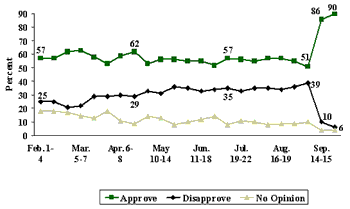In Defying the Odds, we discuss the 2016 campaign. The 2019 update includes a chapter on the 2018 midterms. The 2020 race, the subject of our next book, is well under way. Coronavirus presents unprecedented challenges to public policy and the electoral process.
Trump is on the air every day and has a massive warchest, which he did not have to tap for a nomination campaign. Bill Weld and Joe Walsh, who never got measurable support, have withdrawn. South Carolina, Arizona and Kansas canceled GOP primaries and Nevada canceled its caucuses.
Biden never built a big warchest of his own.
Scott Bland and Elena Schneider at Politico:
And new campaign finance disclosures filed late Friday highlight how Biden captured the Democratic nomination on momentum and message instead of organizational prowess — and the work his operation has to do to build up for a grueling general election campaign against President Donald Trump.
Biden, who brought in $18.1 million in February, was outraised by four other Democratic presidential contenders that month: Bernie Sanders ($47.7 million), Elizabeth Warren ($29.5 million), Amy Klobuchar ($18.7 million) and Pete Buttigieg ($18.6 million).
While Biden’s fundraising took off in March as he started reeling off primary wins, his campaign operation lagged well behind others’. Sanders had 1,215 people on the payroll in February, according to his campaign finance report, while Warren paid salaries to 1,203 different staffers. Buttigieg had over 550 people on his campaign at that point.
Meanwhile, Biden’s payroll stood at 477, as his lower fundraising totals throughout 2019 and early 2020 meant his campaign had to try to keep costs low. Sanders outspent Biden $46 million to $13 million in February — and still finished the month with more cash in the bank, $18.7 million to $12.1 million.
It will be hard for him to catch up.
Maggie Severns and James Arkin at Politico:
The severe economic shock from coronavirus could upend the 2020 election. And Democrats see themselves as having more to lose: President Donald Trump bungled the early days of the coronavirus crisis, they say, and while that could cost him politically, the tanking economy will hurt Democrats’ ability to raise the money challengers need to campaign for the White House and other offices in 2020. Trump’s well-stocked reelection campaign has less to lose amid the current financial uncertainty than does Joe Biden, who is emerging from a costly primary, they argue.
Major donors from both parties already are beginning to scale back after years of riding high off of a booming stock market, donors and fundraisers told POLITICO.
"I’m personally postponing anything where more than two people need to get together until we have an understanding of what the dangers are. And in terms of spending money, I’m trying to cut back as much as possible," said Democratic megadonor and philanthropist Bernard Schwartz, who has given at least $2.8 million to Democratic causes this cycle, including helping a pro-Biden super PAC.
Biden and Trump are starting to work donors via the phone and video meetups, while anxiety rattles through congressional campaigns and some organizations grow nervous about whether they will be able to stay in the black.
It won't take long until campaigns feel the sting, said Amanda Litman, co-founder of Run for Something, which supports down-ballot candidates.
"I think the thing people don’t realize is that campaigns and organizations — both political and nonprofits — don’t keep that much cash on hand," Litman said. "You’re running month to month. One bad month, you can make it through. Two or three, and it can be catastrophic."
Even worse, Bloomberg is breaking his promise to mount a big independent-expenditure effort in the fall.
But Trump has a problem, too.
Alex Isenstadt and Natasha Korecki at Politico:
With the death toll rising and daily life grinding to a halt, Trump’s sprawling political operation has put on hold any plans to use its nine-figure war chest to unload on the former vice president. The strategy, mimicking the playbook of Barack Obama’s 2012 reelection campaign against Mitt Romney, was aimed at crippling the lesser-funded Biden before he could unify the Democratic Party behind him and marshal his forces for November.
The reprieve is a blessing for Biden: Rather than spending valuable time fending off an assault, he is free to present himself as a steady leader amid a national crisis and to regroup for the general election.
The Trump operation’s reassessment underscores how the pandemic has disrupted virtually every element of the campaign for both parties. With less than eight months until Election Day, Trump and Biden are being forced to rethink their plans on everything from fundraising to field operations to staffing.
“With Biden running away with it now, this would have been a good time to define him right off the bat. But it won't break through now, nor would it look good,” said Ari Fleischer, who served as press secretary in the George W. Bush White House. “This hiatus in many ways helps Biden.”
But they are still trying in the fundaising messages:


